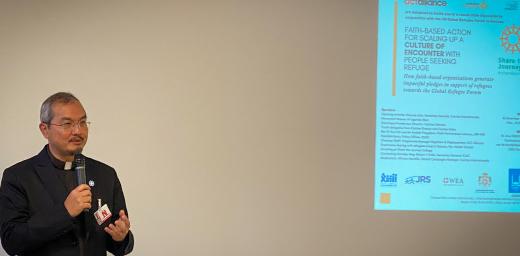Shining Light on the Role of Women in Latin America’s Lutheran Churches
Symbols displayed during prayer at the LAC women theologians' meeting. © LWF/Adriana Gastellu
Regional Network Visualizes “Herstories” Contribution to 2017 Reformation Anniversary
(LWI) – The contribution of women to the 500th anniversary of the Reformation in 2017 and their role in building up Lutheran churches in the Latin American region were the main topics discussed by a group of women theologians gathered in the southern Brazilian city of São Leopoldo.
Meeting under The Lutheran World Federation (LWF) Latin America and Caribbean (LAC) Women and Gender Justice Network, the 25 women theologians from nine LWF member churches in LAC underlined the importance of including women’s stories—“herstories”—and experiences in the history of churches in the region.
Bringing together women theologians and making their reflections visible is part of the work plan of the LWF Women in Church and Society (WICAS) coordination in the region. Like the woman in the Gospel of Luke, who shone a light to search for a lost coin, the 24-27 June WICAS gathering illuminated the stories of the many women who played a role in the life of Latin American churches.
Ivoni Richter Reimer, a Brazilian biblical scholar, helped the theologians to visualize the forgotten women in the Bible by sharing tools to discover their work and importance. They deliberated on women’s participation in the 16th century Reformation of the church and on the LAC network’s potential plans to work with the recently approved LWF Gender Justice Policy.
The Council approved the Gender Justice Policy of the LWF at its June meeting. The final document will be made available this September.
A Crucial Tool for Church Work
Elizabeth Arciniegas Sanchez, WICAS regional coordinator for the Andean region and a member of the LWF Committee for World Service, expressed her hope that the LWF policy will serve as critical tool for the church’s mission and ministry.
“Knowing that the communion of LWF member churches approved this policy offers evidence of the importance of gender justice, and motivates us to include the issue in the work we develop in different ministries in our churches.”
She emphasized the need to nurture a common understanding of the LWF policy document, taking into account the various contexts within the worldwide Lutheran communion.
Referring to the LWF publication It will not be so among you! A Faith Reflection on Gender and Power (2010), Arciniegas described the methodology used to discuss this publication in the Evangelical Lutheran Church of Colombia (IELCO) as “a wonderful experience” that offered space for both women and men from the congregations and other grassroots groups to reflect together on gender relations.
“As the word ‘gender’ still provokes some confusion and sometimes is not well used, […] in IELCO we discussed the theme ‘relationships among men and women,’” she explained. The approach helped participants to express and reflect upon concrete experiences of inequalities in power relations “This brought life and flesh, and daily experience to the issues discussed in the document,” she added.
Arciniegas said she hoped the LAC gathering of women theologians would remain a space to reflect on gender justice and create common strategies for using LWF documents in churches in the region.
“These spaces are helpful in building mutual confidence and motivation in our journey as well as strategies for common advocacies on gender justice,” she emphasized.
Living in a Communion of Churches
Rev. Rosangela Stange, who works at the gender coordination office of the Evangelical Church of the Lutheran Confession in Brazil (IECLB), said the meeting offered an opportunity for the LAC Women and Gender Justice Network to be more visible in the region’s churches.
“The process we made in remembering the principles of the feminist hermeneutic using gender justice tools was crucial in building common methodological instruments to discover and tell the stories of women in our churches,” Stange said.
“The group went through a process that increased our understanding of what it means to be in and live in a communion of churches.”
The meeting agreed on a number of common themes to be worked on in the region while allowing strategies that fit the various contexts. The initiatives will help bring to light women’s stories and experiences in the churches, and draw attention to “her stories” in marking 500 years of the Reformation journey.
LWF secretary for WICAS Rev. Dr Elaine Neuenfeldt underlined that an organized and strong women theologians’ group within the LAC gender justice network is a privileged space to build on strategies to implement the LWF Gender Justice Policy in the region and to publicize the work of women theologians.
Neuenfeldt noted the group’s observation that the number of women theologians with masters or doctorate degrees in theology was decreasing in Latin America. “There is a clear need to strategize and unite efforts to motivate more women to access higher theological studies and to include gender and feminist theology in the curricula of theological education,” she added.





